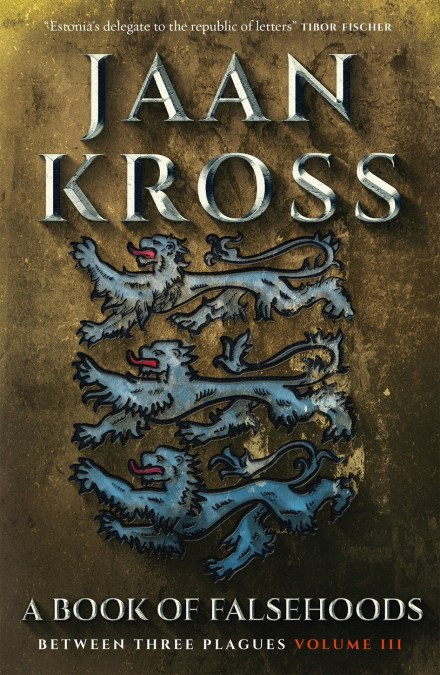A Book of Falsehoods
On sale
4th August 2022
Price: £20
Genre
Early Modern History: C 1450/1500 To C 1700 / Estonia / Fiction In Translation / Historical Fiction / Medieval History / Modern & Contemporary Fiction (post C 1945)
Selected:
Paperback / ISBN-13: 9780857055149
***A Financial Times Fiction in Translation Book of the Year 2022***
The third part in an epic historical trilogy – The Estonian answer to Wolf Hall – by the nation’s greatest modern writer
1578. A ship from Rostock arrives in Tallinn loaded with printed copies of Balthasar Russow’s Chronicle – the culmination of our hero’s life’s work. But though it is an instant success, as it was in Rostock and numerous German cities, not everyone is happy to see it published. A group of local gentry denounce it to the town council as “a book of heinous falsehoods”, and lobby for Balthasar to relieved as pastor of Holy Ghost Church.
But all is not lost. Balthasar may call on a powerful ally – if he is willing to pay the price.
In this final volume, fierce storms, along with famine, war and plague, continue to be loosed upon Livonia. Balthasar’s personal life, too, is fraught with turbulence and loss, much of it stemming from his own jealousy and suspicion.
The third part in an epic historical trilogy – The Estonian answer to Wolf Hall – by the nation’s greatest modern writer
1578. A ship from Rostock arrives in Tallinn loaded with printed copies of Balthasar Russow’s Chronicle – the culmination of our hero’s life’s work. But though it is an instant success, as it was in Rostock and numerous German cities, not everyone is happy to see it published. A group of local gentry denounce it to the town council as “a book of heinous falsehoods”, and lobby for Balthasar to relieved as pastor of Holy Ghost Church.
But all is not lost. Balthasar may call on a powerful ally – if he is willing to pay the price.
In this final volume, fierce storms, along with famine, war and plague, continue to be loosed upon Livonia. Balthasar’s personal life, too, is fraught with turbulence and loss, much of it stemming from his own jealousy and suspicion.
Newsletter Signup
By clicking ‘Sign Up,’ I acknowledge that I have read and agree to Hachette Book Group’s Privacy Policy and Terms of Use
Reviews
He's a marvellous novelist - his scope and depth make him a world writer - and they should just hurry up and give him the Nobel.
He deserved a Nobel prize and would probably have got it had he written in any other language but Estonian.
He's almost alone in writing in the older European tradition of the large-scale historical novel. I'd argue that Kross is heir to the 'great' Russo-European 19th century novelists; his fiction has Tolstoyan sweep. On reading him, moreover, we rediscover that Estonia was always resolutely in Europe and not some obscure outpost this side of the Urals.
No stranger to oppression himself, Kross writes about it with a poignancy devoid of anger.
Hailed as the Estonian answer to Wolf Hall

